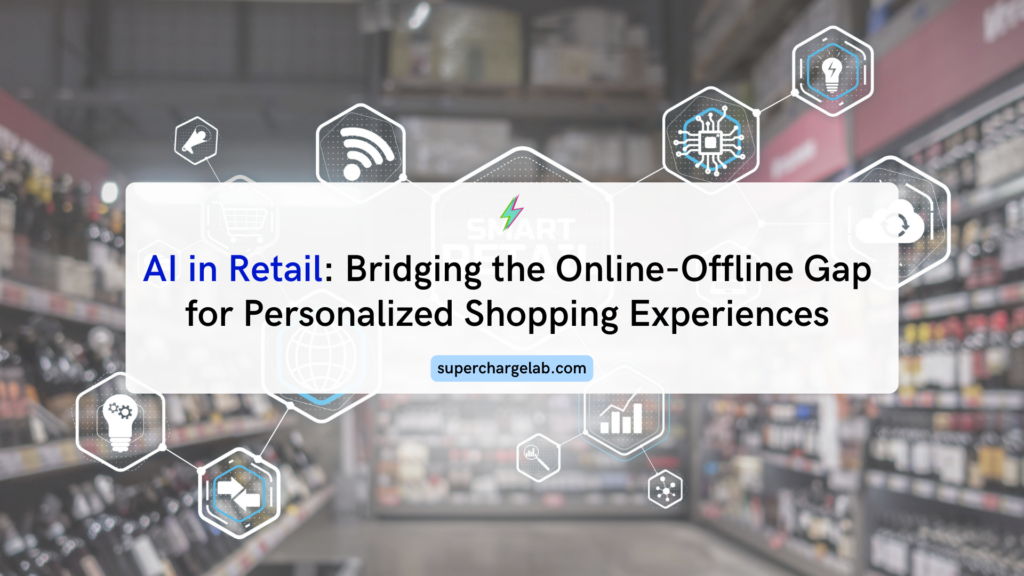
Ever walk into a store and think, ‘Wow, this checkout is so smooth!’? Imagine if that feeling followed you throughout your entire shopping trip. Artificial intelligence (AI) is making this a reality, blurring the lines between online and offline shopping and creating personalized experiences just for you.
1. Why Customer Engagement Matters
Engaging customers is essential for success in the competitive retail landscape. Engaged customers are more likely to make purchases, become loyal brand advocates, and recommend products or services to others. Engaged customers are highly valuable to businesses, leading to increased sales, higher customer lifetime value, and a stronger brand reputation. Gallup’s extensive research on customer engagement consistently emphasizes this connection, with various reports indicating that engaged customers are more likely to spend more, remain loyal, and recommend the brand to others.
However, maintaining customer engagement in the digital age is a challenge. Consumers are bombarded with choices and information, making it difficult for brands to capture and hold their attention. Personalized experiences are key to breaking through the noise and forging lasting connections with customers. Tailoring interactions to individual preferences and needs allows retailers to create a sense of relevance and value that resonates with consumers on a deeper level.
2. AI: The Personal Shopper
AI is revolutionizing customer engagement by acting as a virtual personal shopper. Sophisticated algorithms analyze vast amounts of customer data, including purchase history, browsing behavior, demographics, and social media interactions. This data is used to create detailed customer profiles, allowing retailers to deliver tailored product recommendations, targeted promotions, and personalized content.
For example, if you frequently purchase running shoes online, an AI-powered recommendation engine might suggest other running gear or fitness apparel that aligns with your interests and preferences, increasing the chances of you making additional purchases. Additionally, AI-powered chatbots can provide instant, personalized customer support, answering questions, resolving issues, and even offering styling advice. This 24/7 availability and immediate response time enhances the customer experience and fosters brand loyalty, as customers feel valued and supported throughout their shopping journey.
3. The Power of Personalization in Action
Several brands are already leveraging AI to create innovative and engaging shopping experiences that bridge the gap between the online and offline worlds. Amazon Go stores, for instance, use AI and computer vision to enable a “Just Walk Out” shopping experience. Customers can simply enter the store, grab the items they want, and leave without having to wait in line or check out. The items are automatically charged to their Amazon account, creating a seamless and frictionless shopping experience that saves customers time and enhances convenience.
Nike’s Innovation Center in Shanghai takes personalization to the next level. The center incorporates cutting-edge technology to offer an immersive and interactive experience for customers. Digital boards allow them to test out shoes in gamified virtual basketball simulations, providing a unique and engaging way to experience products. This not only enhances customer engagement but also provides valuable data on product performance and customer preferences, allowing Nike to further tailor its offerings to individual needs.
Innovative approaches to personalization extend beyond individual stores. Even public spaces are being transformed by AI. Consider the concept of “smart” walking streets, where the kinetic energy generated by pedestrians’ footsteps is harvested to power billboards and contribute to the electric microgrid. These billboards can then display personalized content based on the time of day, weather conditions, or even the demographics of the passersby, creating a more relevant and engaging experience for those interacting with the public space.
4. The Future of AI-Powered Engagement
The future of AI-powered customer engagement is bright. As AI technology continues to advance, we can expect even more immersive and personalized shopping experiences. Virtual reality (VR) and augmented reality (AR) can transport customers to virtual stores, allowing them to try on clothes or visualize furniture in their own homes before making a purchase, thus reducing the likelihood of returns and increasing customer satisfaction. AI-powered styling advice and virtual fitting rooms can further personalize the shopping experience, helping customers find the perfect products that match their individual style and body type, making the shopping process more enjoyable and efficient.
Moreover, AI can enable hyper-personalization, where every aspect of the shopping experience, from product recommendations to marketing messages, is tailored to the individual customer in real-time. This level of personalization can significantly enhance customer satisfaction, increase sales, and build lasting brand loyalty, as customers feel understood and valued by the brands they interact with.
5. Balancing Personalization with Privacy
While the benefits of AI-powered personalization are clear, it’s important to address concerns about data collection and privacy. Retailers must be transparent about how they collect and use customer data, and they should give customers control over their data and the ability to opt out of personalized experiences if they choose. Striking the right balance between personalization and privacy is essential for building trust with customers and ensuring the ethical use of AI in retail. By prioritizing transparency, consent, and data security, retailers can harness the power of AI to enhance customer engagement while respecting individual privacy rights.
6. Conclusion
AI is transforming the retail landscape by enabling personalized shopping experiences that bridge the gap between the online and offline worlds. By leveraging AI to understand and anticipate customer needs, retailers can create more engaging, relevant, and enjoyable shopping journeys. As AI technology continues to evolve, we can expect even more innovative and personalized experiences, like the smart walking streets and Nike Innovation Center, that will reshape the way we shop and interact with brands, ultimately leading to a more fulfilling and rewarding shopping experience for consumers.
If you’re a retail business, let’s explore how we can help you create a more engaging and profitable customer experience. https://calendly.com/superchargelab